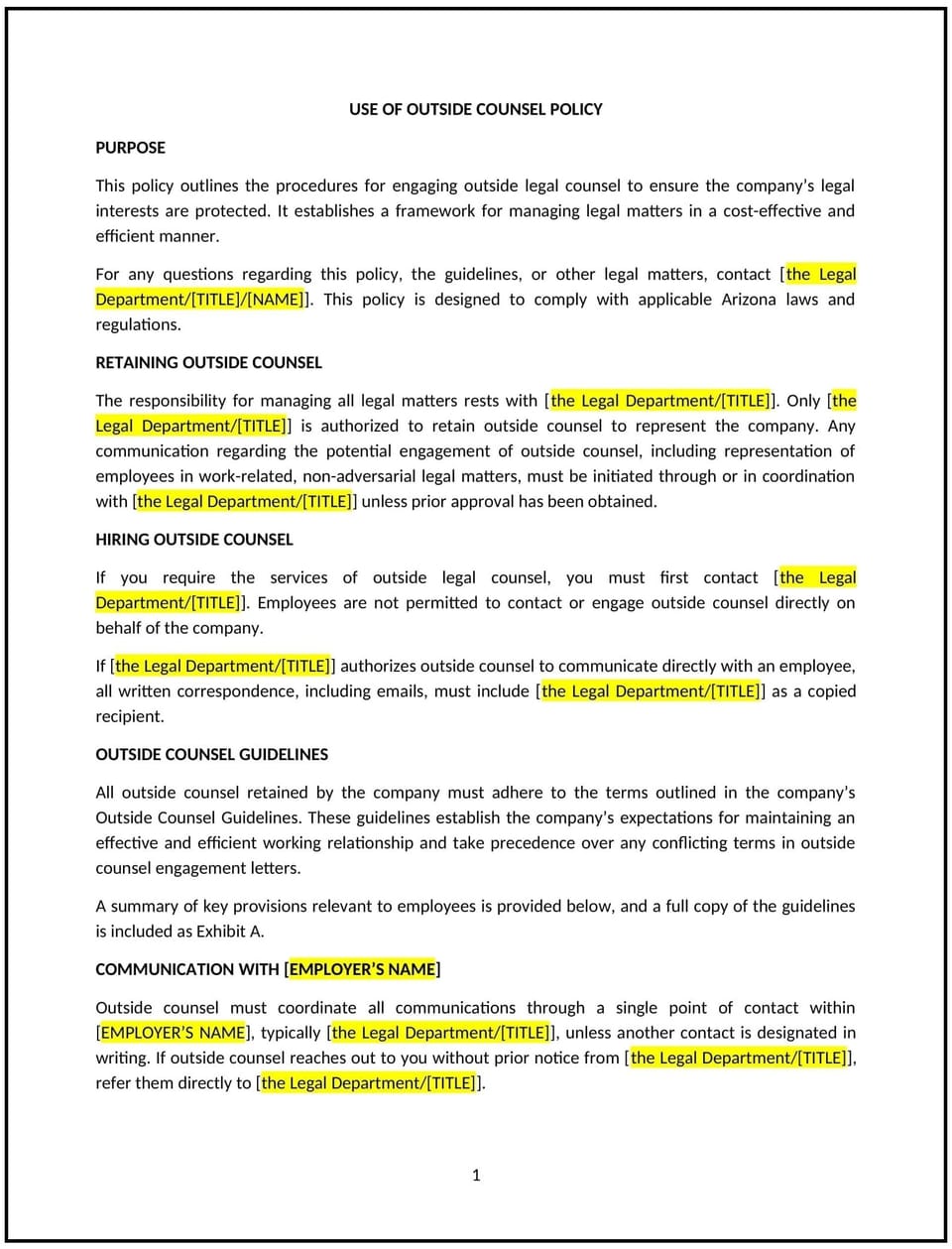Use of outside counsel policy (Arizona): Free template

Use of outside counsel policy (Arizona)
In Arizona, a use of outside counsel policy provides businesses with clear guidelines for engaging external legal services. This policy ensures that businesses maintain control over legal costs, establish clear expectations with outside counsel, and ensure compliance with applicable laws and regulations.
This policy outlines when and how the business should engage outside counsel, the criteria for selecting firms or individual attorneys, and the process for managing legal matters outsourced to external providers.
By implementing this policy, Arizona businesses can streamline legal operations, reduce legal risks, and ensure effective management of external legal resources.
How to use this use of outside counsel policy (Arizona)
- Define criteria for engagement: Specify the situations in which outside counsel should be used, such as specialized legal expertise, conflicts of interest, or overflow legal work.
- Establish selection procedures: Outline the process for selecting outside counsel, including considerations such as expertise, reputation, cost, and potential conflicts.
- Set cost management guidelines: Define expectations for fee structures, billing practices, and cost estimates. Ensure that outside counsel provides clear and transparent pricing.
- Define scope of work: Ensure that the engagement letter with outside counsel outlines the specific services to be provided, deliverables, timelines, and performance expectations.
- Monitor performance: Implement a system to monitor the performance of outside counsel, including regular updates, communication protocols, and evaluating outcomes to ensure that legal services align with business needs.
Benefits of using this use of outside counsel policy (Arizona)
This policy offers several advantages for Arizona businesses:
- Controls legal costs: Establishing clear billing and engagement guidelines ensures that legal expenses are managed efficiently and do not exceed budgeted amounts.
- Ensures quality service: By selecting outside counsel based on clear criteria, the business can ensure it receives high-quality legal expertise tailored to its needs.
- Enhances efficiency: The policy streamlines the process of hiring and managing outside counsel, allowing the business to focus on its core operations while ensuring that legal matters are handled appropriately.
- Reduces legal risks: Proper management and oversight of outside counsel help prevent potential legal pitfalls, ensuring compliance with applicable laws and regulations.
- Improves transparency: Clear guidelines and expectations promote transparency in legal relationships and provide an audit trail for all external legal services.
Tips for using this use of outside counsel policy (Arizona)
- Address Arizona-specific considerations: Include any Arizona-specific legal requirements or regional factors that may impact the selection of outside counsel or the management of legal matters.
- Regularly review legal providers: Periodically evaluate the performance and cost-effectiveness of outside counsel to ensure the business is receiving the best value for its legal investment.
- Communicate clearly with outside counsel: Establish regular communication and reporting protocols to keep legal matters on track and aligned with business objectives.
- Use technology: Leverage legal management software to track outside counsel engagements, billing, and outcomes for improved oversight and efficiency.
- Update the policy as needed: Revise the policy to reflect changes in business strategy, legal needs, or compliance requirements, ensuring it stays relevant and effective.
Q: How does this policy help the business manage legal costs?
A: This policy sets clear guidelines for engaging outside counsel, defining billing practices and cost expectations, which helps the business control and predict legal expenses.
Q: When should the business engage outside counsel?
A: Outside counsel should be engaged when specialized legal expertise is required, when there is a conflict of interest with in-house counsel, or when there is a need for additional legal capacity due to workload.
Q: How does the business select outside counsel?
A: The business selects outside counsel based on criteria such as legal expertise, reputation, past performance, cost, and whether the firm’s values align with the business’s needs.
Q: How are the performance and outcomes of outside counsel evaluated?
A: The business can evaluate outside counsel through regular updates, assessing whether they meet performance expectations, adhere to agreed-upon timelines, and provide value in relation to the cost.
Q: What happens if outside counsel does not meet expectations?
A: If outside counsel does not meet expectations, the business should review the engagement terms, discuss concerns with the firm, and, if necessary, consider terminating the relationship and selecting a new provider.
This article contains general legal information and does not contain legal advice. Cobrief is not a law firm or a substitute for an attorney or law firm. The law is complex and changes often. For legal advice, please ask a lawyer.


